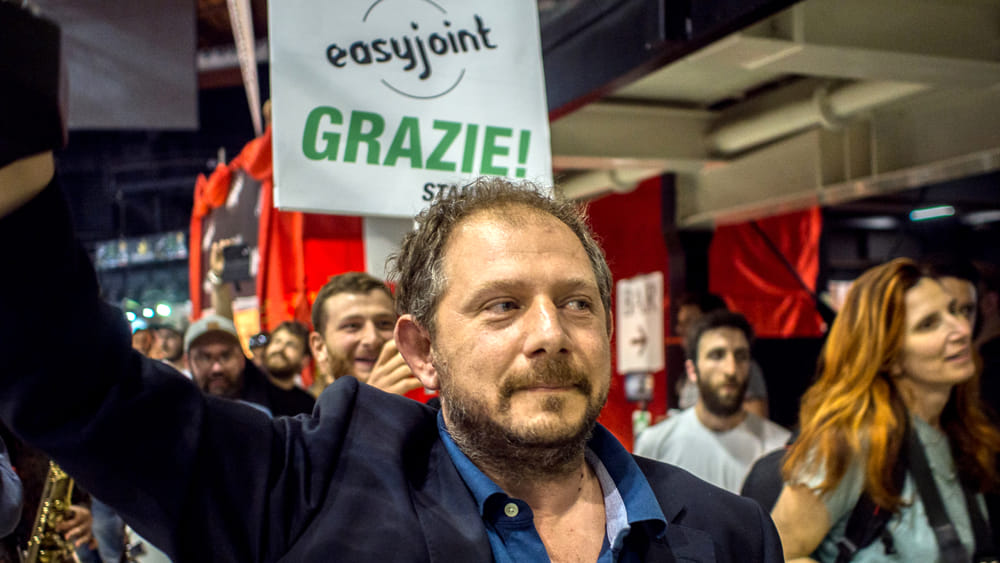In a decisive victory for Italy’s embattled hemp industry, a Parma court affirmed the legality of hemp flowers and derivatives under European Union law.
The ruling comes after six years of investigation and the trial of entrepreneur Luca Marola, founder of the pioneering hemp company EasyJoint, a maker of low-THC smokable hemp flower products – referred to as “cannabis light” in Italy. The decision directly counters claims by Italian prosecutors that hemp inflorescences and oils — even if derived from certified low-THC industrial varieties — should be treated as narcotics.
The case comes as Prime Minister Giorgia Meloni’s administration faces growing backlash over a sweeping “Security Decree” that criminalizes hemp products in defiance of EU norms and without scientific justification.
Meloni’s hemp ban
Meloni’s decree, issued in April, reclassified non-psychoactive hemp compounds such as CBD, CBG, and CBN as narcotics, effectively banning the cultivation, sale, and possession of hemp flower products across Italy. The measure, passed using emergency powers and bypassing Parliament, was part of a broader crackdown framed as a public safety initiative. It has been widely criticized by legal experts, business leaders, and EU officials as unconstitutional and economically destructive.
The government’s ban on hemp is contained in Article 18 of the decree — referred to by critics as the “Repression Decree” — which also includes a raft of new crimes and penalties. Detractors say the law is an ideologically driven attack on civil liberties and free enterprise, with little regard for science or EU obligations.
‘Grotesque investigation’
In the Parma case, Marola had been charged in 2019 with possession and trafficking of narcotics following a raid that seized more than 650 kilograms of hemp flowers and 19 liters of hemp oil. Prosecutors sought nearly five years of jail time and a €55,000 fine. The court, however, fully acquitted Marola and rejected the prosecutor’s case as unfounded.
Defense attorney Giacomo Bulleri argued that criminalizing products derived from certified hemp varieties contradicted both Italian and EU law. He warned that a conviction would have triggered a legal conflict with the European Union’s internal market rules, which protect the free movement of agricultural goods like industrial hemp and CBD.
“This was a grotesque investigation,” Marola said following the verdict. “They destroyed a €2 million warehouse and the leading ‘cannabis light’ company in Italy. Any reform of justice must include civil liability for magistrates who abuse their power.” EasyJoint, once Italy’s leading hemp brand, was removed from the Chamber of Commerce and forced to close amid the legal battle.
Industry response
Opposition lawmakers welcomed the ruling as a repudiation of the Meloni government’s campaign against hemp. “This verdict demolishes the ideological theory that hemp flowers and oils are drugs regardless of their content,” said Chiara Appendino, vice president of the Five Star Movement. “This sends a clear message: banning everything out of ideology only destroys businesses and disrupts lives.”
Stefano Vaccari, a leader in the Democratic Party, called the decision “the first response to the ideological fury of the Meloni government.” He added that hemp flowers do not qualify as narcotics under the penal code, despite the administration’s attempts to redefine them.
Italy’s hemp industry comprises more than 3,000 companies and employs upwards of 23,000 people. Industry associations say the decree, if upheld, will decimate a €2 billion sector.
Legal challenges ahead
Legal experts say the Parma ruling may offer a template for challenging the national decree. Under EU law, hemp-derived products with THC levels below 0.3% are not classified as drugs. The European Court of Justice ruled in 2020 that CBD is not a narcotic and that EU member states may not restrict its sale without scientific proof of harm. Critics argue that Italy’s actions violate both EU treaties and Articles 25 and 77 of its Constitution, which require parliamentary approval and proportionality in lawmaking.
While a separate April ruling by Lazio’s regional court upheld a ban on oral CBD formulations, citing public health concerns, many experts argue those concerns are exaggerated and unsupported by science. Constitutional law professor Alfonso Celotto has stated that Italian courts and administrative bodies are obligated to disregard national laws that conflict with EU law, opening the door for further legal resistance.
Economic and political fallout
The decree’s impact has already been profound. Thousands of businesses have shuttered or entered legal limbo, and many young entrepreneurs who built careers in the sector now face prosecution. “From one day to the next, honest agricultural producers have been turned into criminals,” said Canapa Sativa Italia, one of several trade groups fighting the decree in court.
Meloni’s government has so far refused to reconsider, even as European regulators express concern and international observers question the legality of the crackdown. Critics argue the move was designed to score political points by stoking fears rather than addressing real public health issues.
The future of the decree remains uncertain. President Sergio Mattarella has not yet signed it into permanent law, and Parliament must ratify or reject the measure by early June. Meanwhile, the European Commission is expected to review potential violations of the common market.
“The world of industrial hemp is not willing to silently suffer illogical and unconstitutional decisions,” said a statement from industry leaders. As legal challenges gain momentum and international scrutiny grows, Italy’s hemp sector may yet find vindication — and survival — in the courts of law and public opinion.
The case comes as Prime Minister Giorgia Meloni’s administration faces growing backlash over a sweeping “Security Decree” that criminalizes hemp products. Read More


